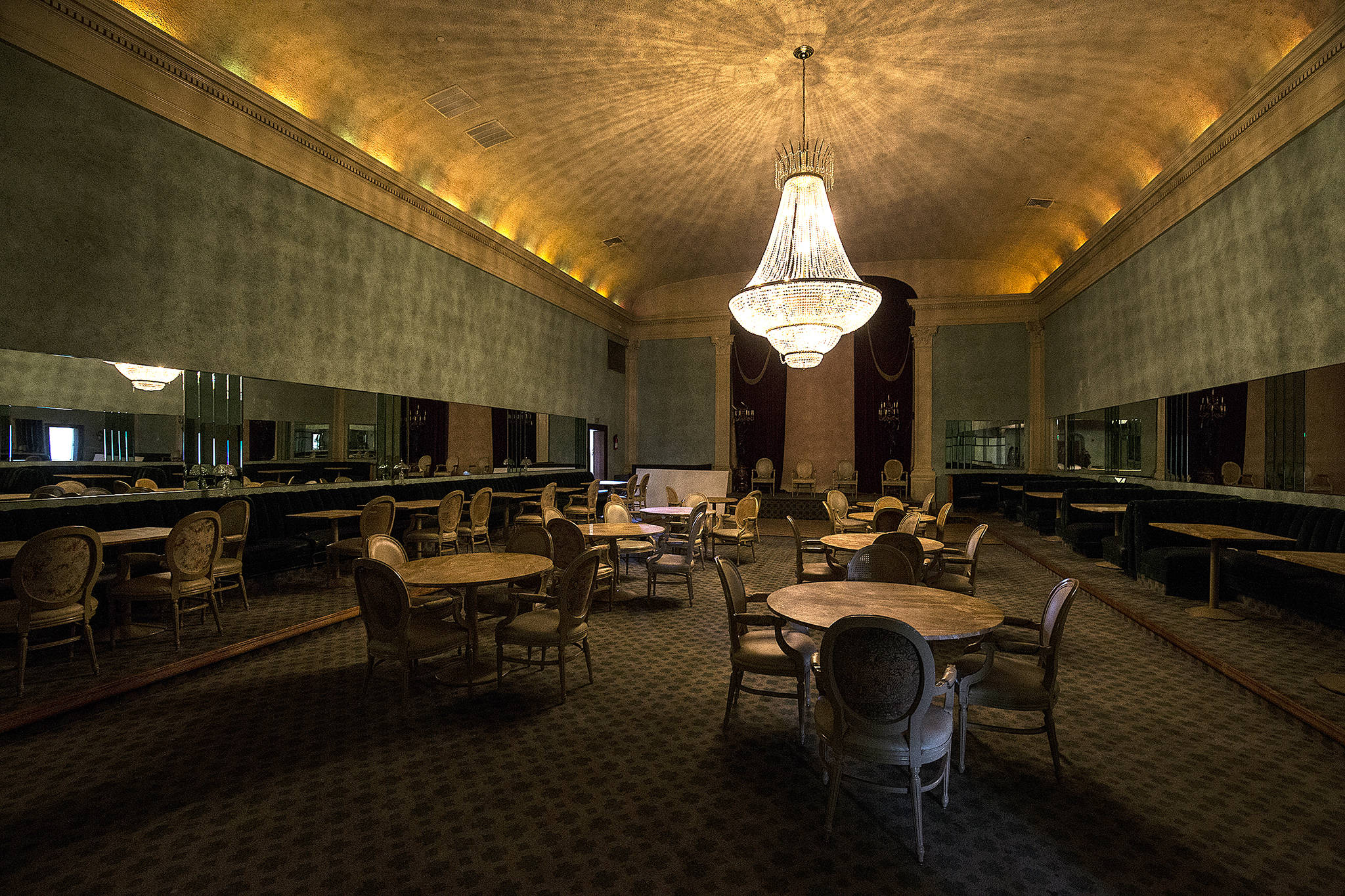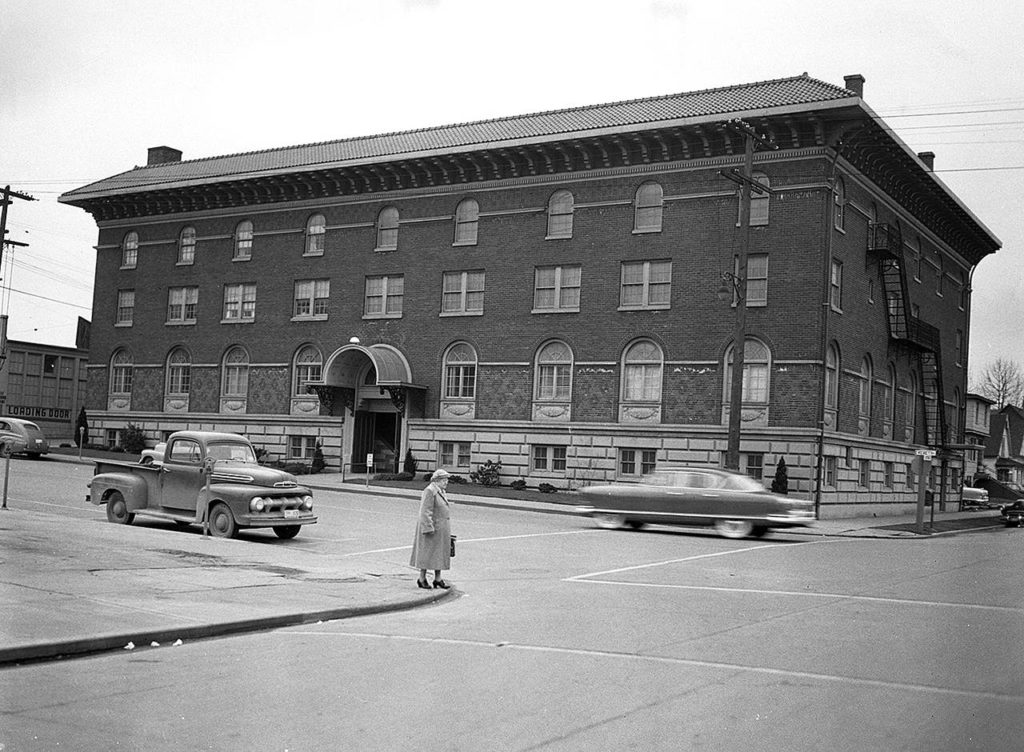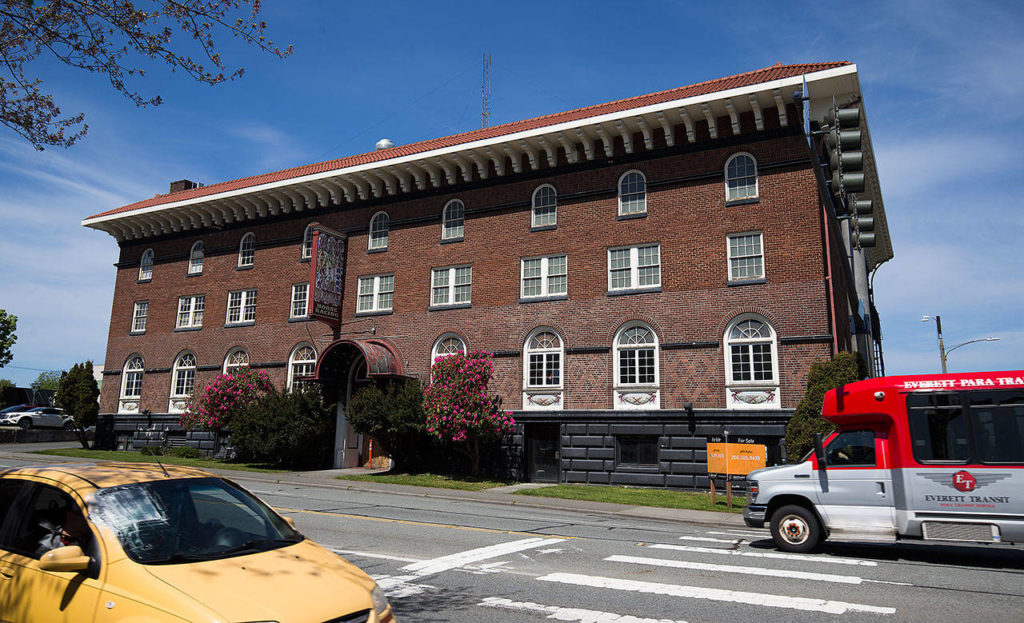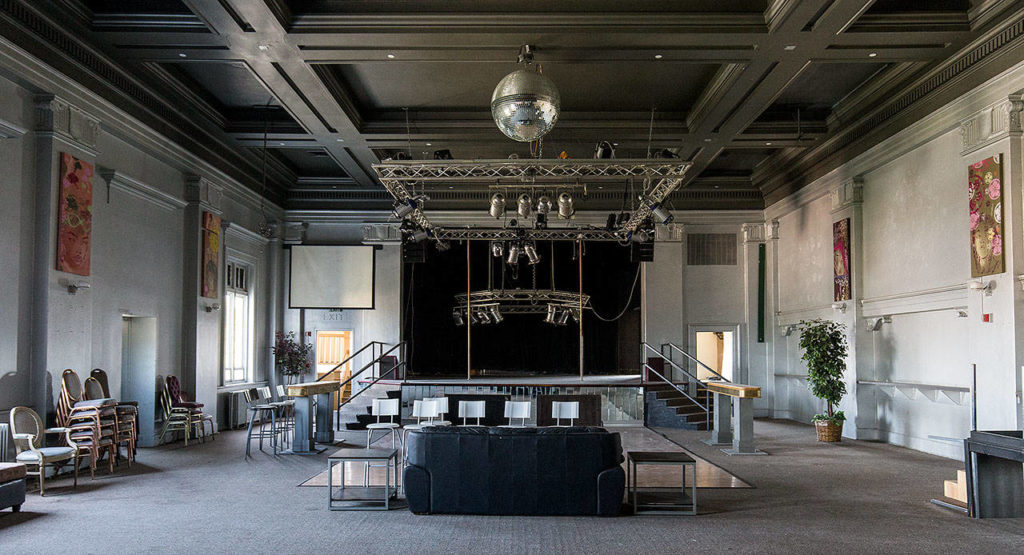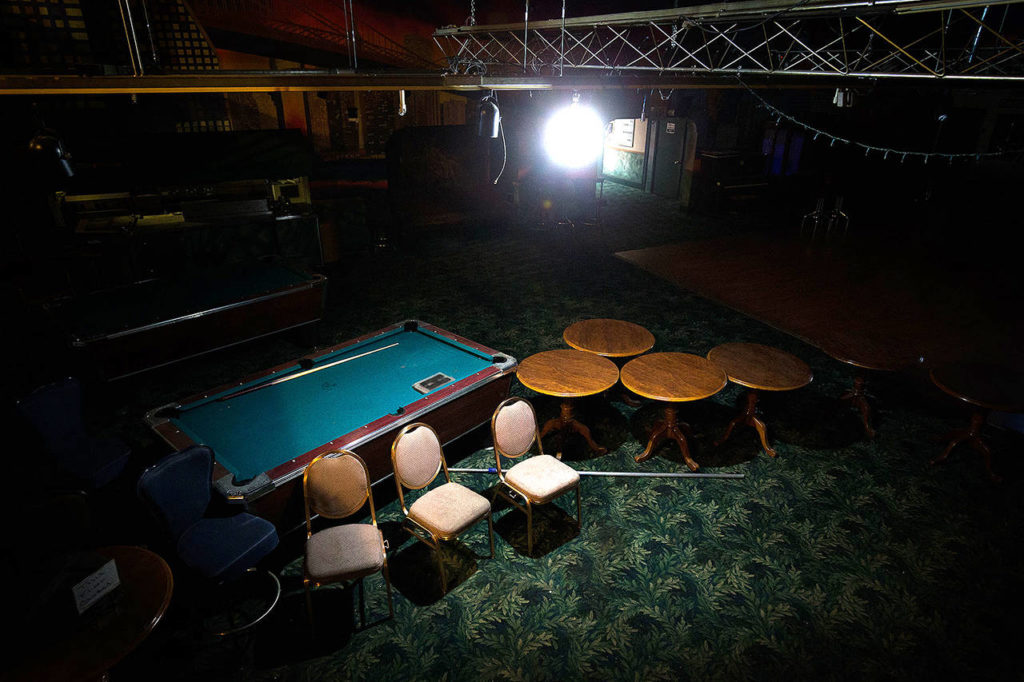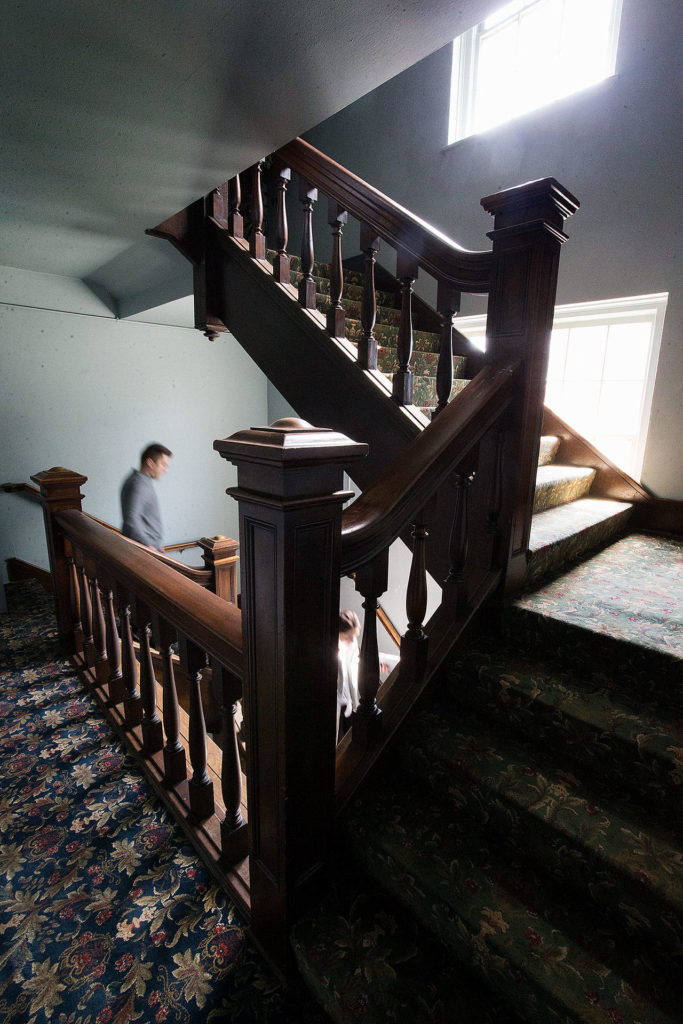EVERETT — Cloudy skies peek through the windows to illuminate the small room, where two men sit at long tables facing a wall lined with TVs.
A red and blue “Open” sign is one of the only clues to the outside world that there’s anyone inside. It’s in the corner of a window, two floors above Wetmore Avenue. The neon glow turns on at 9 a.m., Wednesday through Sunday.
Emerald Downs off-track betting is the last business inside the edifice at 1611 Everett Ave. The structure’s current state doesn’t reflect its past.
It was built nearly a century ago with brick and goodwill, as a way to recognize those who served in World War I. It started as a community center, later became a temple for the Masonic Order, and then a nightclub and restaurant.
The property has changed owners over time, and is up for sale again. The asking price is $2.5 million. It’s been on the market for about five years.
Westlake Associates, Inc. Realtor Jeff Ayers has been in charge of the property for half that time. He’s seen some interest, but hasn’t been able to make a deal.
It now sits largely empty, aside from those who bet on the horses.
‘Reminder of civic devotion’
The city had fallen on hard times.
A shootout in 1916 known as the Everett Massacre was a stain on the city. Two deputies and at least five members of a radical labor group known as the Wobblies were killed that day as a long-simmering battle between mill owners and workers erupted in gunfire on the waterfront.
World War I was ongoing, and an economic recession had hit the region.
The city began to pull together a few years later to build the Knights of Columbus Community Center and War Memorial.
“The (project) was perhaps the earliest manifestation in Everett of a new sense of cooperation and civic spirit generated by the experience of the Great War,” the late Snohomish County historian David Dilgard once wrote.
In June 1920, the Knights of Columbus started the fundraiser with a goal to collect $150,000. The organization, a Roman Catholic men’s group, has been in Everett for more than a century.
After a week-long drive, hundreds gathered to learn the final total at a Catholic church hall at Colby Avenue and 25th Street.
At first the tally was a few thousand dollars short, but within minutes the group had pledged enough to pass its target.
The crowd poured into the street and marched south to Hewitt Avenue. They cheered and yelled while car horns honked.
“The real benefits will come to them in after years — to their children and their children’s children, an omnipresent reminder of civic devotion and loyalty,” one newspaper reporter wrote.
The building opened more than a year later. In the basement, there was a 24-by-36 foot swimming pool and a gymnasium with a maple court. There also was a dance floor, billiard hall and a sound-proof auditorium, along with a couple of reading lounges.
It belonged to the Knights of Columbus for less than a decade. The organization couldn’t afford to keep the building, and in 1927 the bank foreclosed on it. The next year it was purchased by the Masonic Order.
A place to gather
Dorothy Vognild was last inside the building nearly 80 years ago. Back then she was a teenager who practiced on a drill team called The Rainbow Girls.
Vognild, now 91, has lived in Everett her entire life. Her father was part of the Masonic Order. His membership meant she could join the all-girls squad that practiced in the auditorium.
Black-and-white photos from that time show Vognild in her uniform, standing outside the building against the distinct stone work.
On the back is a hand-written date — 1944. She was on the team for two years and made life-long friends.
A couple of decades later, cousins Debbie Martin Galuska and Barbara Valentine Obee began to visit the hall as children. Their parents were members of an organization called the Ancient Order of United Workmen. The girls visited monthly as part of a junior lodge.
They looked forward to the gatherings. Growing up on opposite sides of town, it was hard to see each other often.
“In those days, Everett was real small,” Obee said. “From the north end to the south end, there were trees, there was nothing.”
“Forty-First Street was like the end of the earth,” Galuska said. “There was nothing beyond that we considered Everett.”
Galuska most clearly remembers the stench of stale cigars.
“It would just hit you, because of all those years of older gentlemen sitting there and smoking in those big armchairs that were everywhere,” she said.
The women have strong ties to the Everett area. Their great-grandfather moved to the city in 1905. The family has stayed since.
Galuska and Obee consider the lodge a staple of their childhood.
“I think it was one of the most important things for Everett at the time,” Obee said. “I don’t remember that building being like any other.”
In the 1970s, it was placed on the National Register of Historic Places. That recognition doesn’t save it from renovations or demolition.
Club Broadway
In 1990, Allen Hemmat bought the building from the Masonic Order. He had a dream to build a center with all kinds of entertainment under one roof, said Sharon Wilcox, a co-owner of the building and Hemmat’s ex-wife.
He created Club Broadway.
On the third floor, the couple opened the Manhattan Room, a restaurant with vaulted ceilings, a massive chandelier and mirrored walls. They turned the rest of the space into multiple clubs, each with a different theme.
Contemporary music filled the Starlight Room, with a big dance floor and spot lighting. Jazz, country and other genres played in separate sections.
When it first opened, Club Broadway was packed with a line out the door, Wilcox said.
“It was the place to be because there wasn’t anything like it,” she said.
Wilcox and Hemmat operated the club until about eight years ago, when they passed operating duties on to a third party. Things went downhill.
Today, a former disco-themed club on the third floor is frozen in time. The bar is still stocked with glassware. Chairs, once used by tired dancers to rest their feet, line the silver-painted walls.
Rumors have it Ray Charles once played in this room, where cobwebs now hang from the scaffolding.
One floor below, Emerald Downs is the only business of the Club Broadway era that remains.
‘Some win, some don’t’
Judy Sande has been working at the off-track betting joint since 2005. On a normal day, about 10 patrons come through.
“We don’t have a usual customer,” she said.
Some folks don’t have anywhere better to go. They’ll pay the $4 admission fee and drink the free coffee.
“Then I have dentists, doctors, judges, business people that come in and spend a couple of hours here a couple of times a week,” Sande said. “We have people who bet $20, some bet thousands. Some win, some don’t.”
Unlike other Emerald Downs off-track betting sites, the Everett location doesn’t have food, live music or a bar. The building is unheated.
Visitors enter through a back door, under an awning that reads “Big Apple Casino.” Some smoke there between the races.
Inside, they walk through the casino’s dust-covered remains, past retired pool tables. They make their way upstairs to place bets.
“People don’t know we’re here,” Sande said. “They think we’ve been closed for years. I got my little open sign over there, but it’s kind of small.”
Dana Oliver works just across Everett Avenue. She’s the executive director of the Downtown Everett Association.
She would like to see an anchor business inside the building someday, similar to Funko nearby, that would draw people from faraway places. Others she’s talked to have hoped for a McMenamins restaurant.
Oliver can see the old building from the window near her desk.
“It makes me sad,” she said. “I think it just has to take the right person who will love it back into existence and a new purpose.”
Stephanie Davey: 425-339-3192; sdavey@heraldnet.com; Twitter: @stephrdavey.
Talk to us
> Give us your news tips.
> Send us a letter to the editor.
> More Herald contact information.
